The Electronic Intifada 5 October 2016
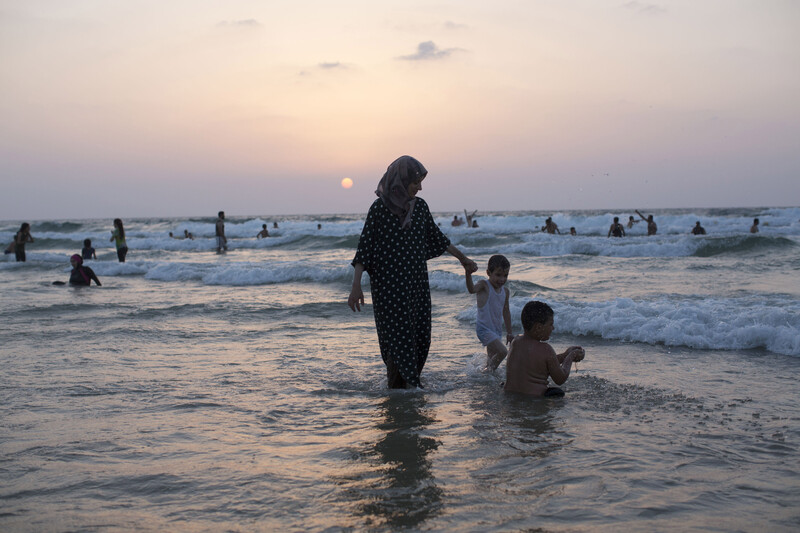
Palestinians spend time at the beach in Jaffa during the three day Eid al-Adha holiday on 15 September. Thousands of Palestinians from the West Bank swam at beaches in and around Tel Aviv after being granted permits to visit during the holiday. Palestinians in the West Bank and Gaza Strip are barred from entering present-day Israel without special permits.
ActiveStillsThe close of September marked a year since the emergence of a new and ongoing phase of rebellion and confrontation between Palestinians and Israeli forces, during which approximately 250 Palestinians and 30 Israelis have been killed.
Ten Palestinians, including five children, were killed by Israeli forces during September.
Four boys were shot and fatally wounded in the Hebron area of the occupied West Bank during what Israel alleges were stabbing or car ramming attacks or attempted attacks, though no Israelis were physically injured in most of those incidents. A fifth boy was killed after he was directly hit by a flare bomb fired by a soldier during a protest in Gaza.
Two young Palestinian men were fatally wounded during separate army raids in the West Bank, and two other Palestinians, as well as a Jordanian national, were killed after allegedly stabbing and injuring Israeli soldiers in separate incidents during the month.
Israel transferred the bodies of three Palestinians killed by its forces months earlier: Bahaa Alayan, 23, who was shot dead after he and his cousin killed two Israelis on a bus; Muhammad Abu Khalaf, 20, whose apparent execution by Border Police combatants was caught on video by an Al Jazeera camera crew; and Abd al-Muhsen Hassuneh, 21, killed during what Israel alleges was a car ramming attack – his family say he was heading to a nearby mosque to distribute sweets in celebration of his newly announced engagement when he was slain.
A Palestinian died and three others were critically injured when a tunnel collapsed on Gaza’s northern boundary with Israel.
Israel struck Gaza with air and artillery fire multiple times during the month and leveled lands in the south of the territory, in addition to opening warning fire at Palestinians at sea and around the so-called buffer zone near the boundary with Israel.
Egypt opened Rafah crossing – the sole point of exit and entry for the vast majority of the 1.9 million Palestinians in Gaza – for four days in September to allow travel for Hajj pilgrims. The crossing has been partially opened on just 23 days this year, according to United Nations monitoring.
Demolitions
Israel destroyed 33 Palestinian-owned structures in the West Bank between 26 and 28 September on the pretext that they were built without permits, in addition to demolitions undertaken earlier in the month.
“These incidents bring the total number of structures destroyed or confiscated by the Israeli authorities in the West Bank since the beginning of 2016 to 878,” the UN monitoring group OCHA stated.
“This represents a 60 percent increase compared to the figure for the whole of 2015 and is the largest number of structures targeted in any full year since 2008, when OCHA began systematically documenting this phenomenon,” the group added.
“Due to discriminatory and unlawful planning processes, it is almost impossible for Palestinians to obtain building permits in the vast majority of Area C and East Jerusalem,” OCHA added, referring to the more than half of the West Bank under full Israeli control.
“The systematic destruction of property in this context, along with other factors, contributes to the generation of a coercive environment pressuring residents to leave,” according to OCHA.
Israeli police also forcibly evicted a Palestinian family from their home in the Old City of Jerusalem, which the family had been renting since the 1930s, and handed it to an Israeli settler group, according to OCHA.
Israeli forces also destroyed a home in the town of Majdal Shams – the first such demolition in the occupied Syrian Golan Heights for more than 30 years, according to the Al-Marsad human rights group based in the territory.
In an appeal to the European Union, Al-Marsad states that the Syrian owners of dozens of homes have been notified that their houses are due to be demolished on the pretext that they were built without permits.
“As a result of the severe restrictions imposed by Israeli planning committees, it is close to impossible for the native Syrian population in the remaining five Syrian villages in the occupied Syrian Golan to obtain the necessary building permits,” Al-Marsad stated.
“The Syrian population is forced to build homes without building permits, as this is the only way to meet their housing needs given unprecedented levels of overcrowding.”
Syria
More than 40 Palestinians died as a result of the ongoing violence in Syria during September, according to the Action Group for Palestinians in Syria.
More than two dozen were killed while fighting in militias allied with the Syrian government, and most of those fighters belonged to Jaysh al-Tahrir al-Filastini, to which Palestinian refugees in the country are conscripted. Seven more Palestinian fighters died in a US airstrike.
Three Palestinians were reported to have died from torture in Syrian government prison during the month, and another from lack of access to medical care. Two more were killed during a bombing on a Palestinian Baathist military unit’s office in Damascus, and a Palestinian operative with Syrian government intelligence was reportedly kidnapped by rebels and beheaded.
Khan Eshieh refugee camp near Damascus came under heavy bombardment by Syrian and Russian forces once again in late September. A school run by UNRWA, the UN agency for Palestine refugees, was hit while students and teachers were present on 28 September.
“Residents remain determined to keep armed elements out of the camp, resisting the entrance of militias and/or their members,” Jafra Foundation, a Palestinian volunteer and relief group in Syria, stated.
Despite calls for the camp to be treated as neutral territory during the ongoing fighting between Syrian government and rebel forces, “since May 2016, more than 25 civilians have been killed by heavy shelling, rockets, barrel and cluster bombs,” according to Jafra.
Islamic State fighters reportedly seized an UNRWA school in Yarmouk refugee camp near Damascus.
Chris Gunness, a spokesperson with the agency, told The Electronic Intifada that it was unable to verify or deny reports and that UNRWA has not operated any of its 29 schools in Yarmouk since December 2012.
“UNRWA stresses the need for all relevant actors to protect civilians and refugees and in particular children and respect the inviolability of UN premises at all times as required by international law,” Gunness added.
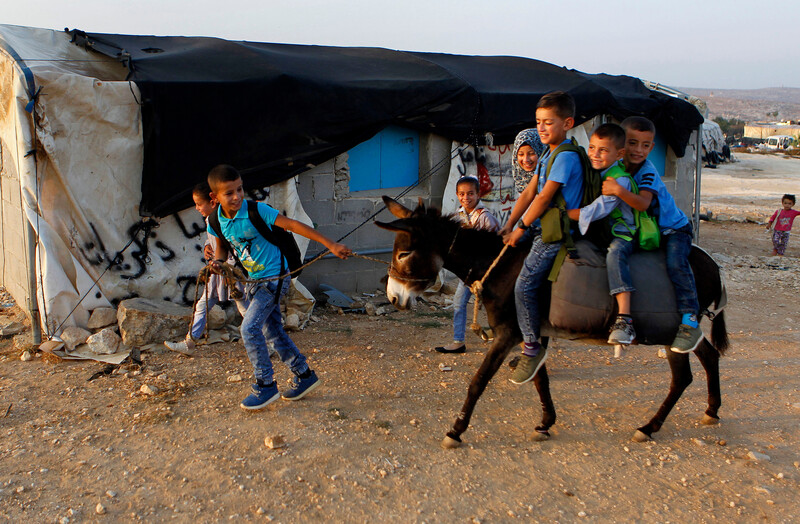
Palestinian students head to school in the West Bank village of Susiya, near the city of Hebron, on 1 September. Children in rural communities in the area walk long distances each day to reach school as Israel forbids building of infrastructure such as schools.
APA images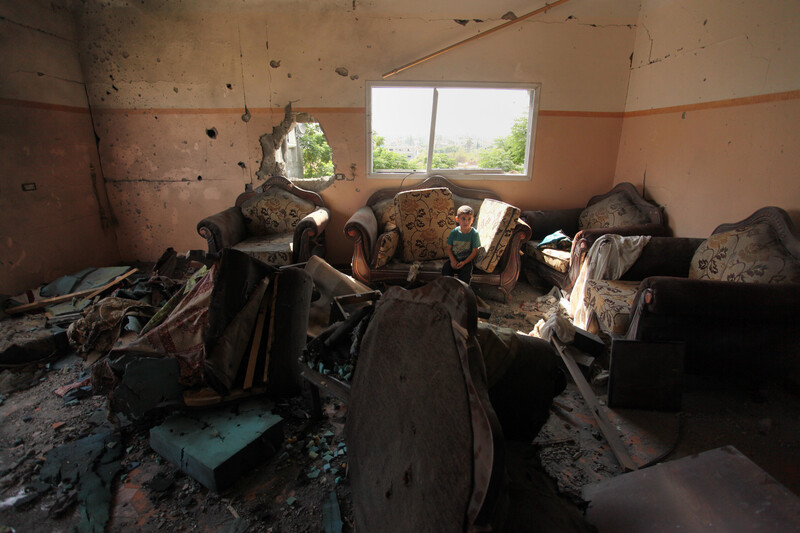
A home in the northern Gaza Strip town of Beit Hanoun after it was hit by Israeli tank fire on 6 September. Israel fired on the Gaza Strip after its forces were fired on from inside Gaza.
APA images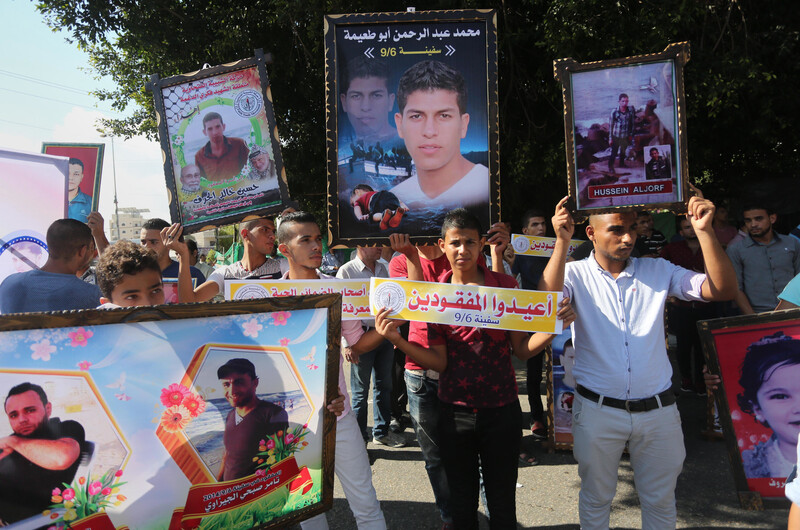
Palestinians hold pictures of their missing relatives during a Gaza City protest on 6 September to mark the second anniversary of one of the deadliest migrant shipwrecks on record. Palestinians from Gaza are among those who went missing after a boat with approximately 500 persons on board was intentionally capsized by traffickers as it made its way from Egypt to Italy.
APA images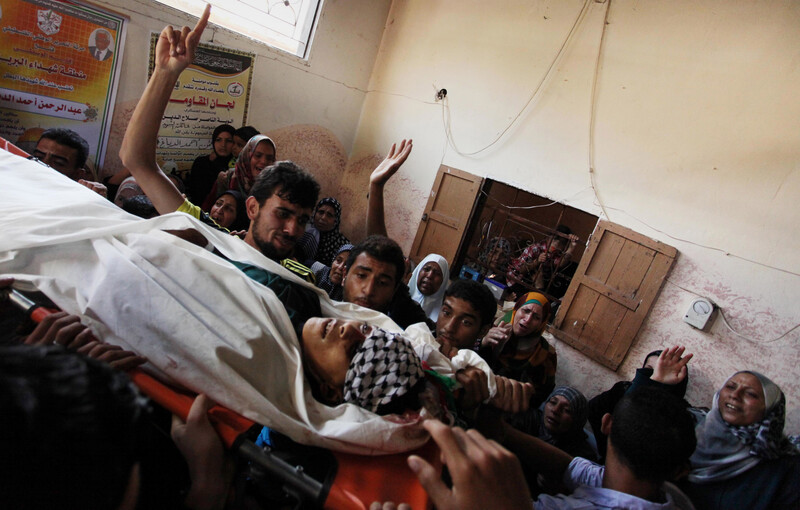
Mourners carry the body of Abd al-Rahman al-Dabbagh during the 16-year-old’s funeral in the central Gaza Strip on 10 September. The boy was killed by a flare bomb fired by an Israeli soldier during a protest near the Gaza-Israel boundary.
APA images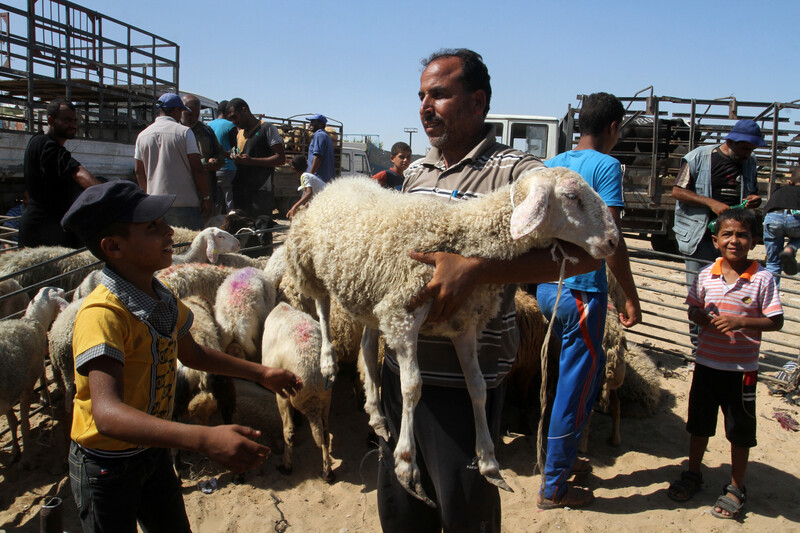
Palestinians buy sheep at a livestock market in Rafah, southern Gaza Strip, ahead of the Eid al-Adha holiday on 10 September.
APA images
Hebron’s Ahli al-Khalil football club celebrates after beating Shabab al-Khalil during a Super Cup soccer match in the West Bank city of Hebron on 9 September.
APA images
A Palestinian vendor sells nuts at a market ahead of the Eid al-Adha holiday in the West Bank city of Nablus on 11 September.
APA images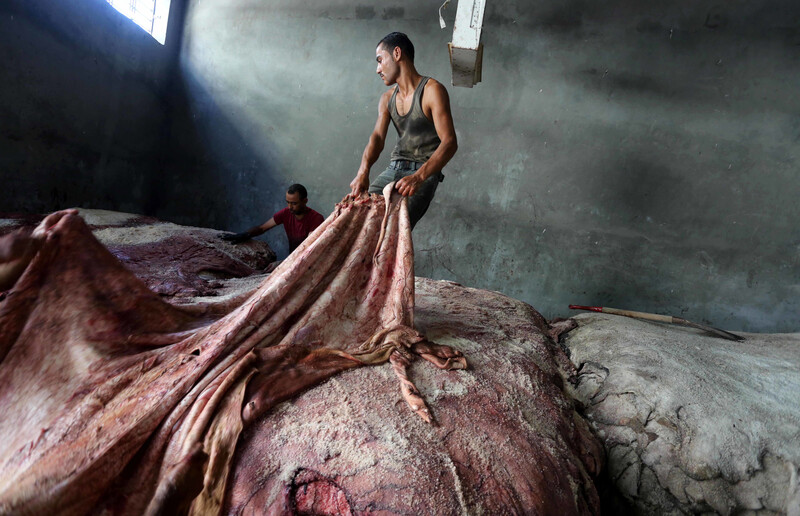
A Palestinian tannery worker in Gaza City salts the hides of sacrificed animals during the second day of Eid al-Adha, the Feast of the Sacrifice, 13 September. The holiday marks the end of the annual Hajj pilgrimage to Mecca and commemorates the Prophet Abraham’s readiness to sacrifice his son to show obedience to God.
APA images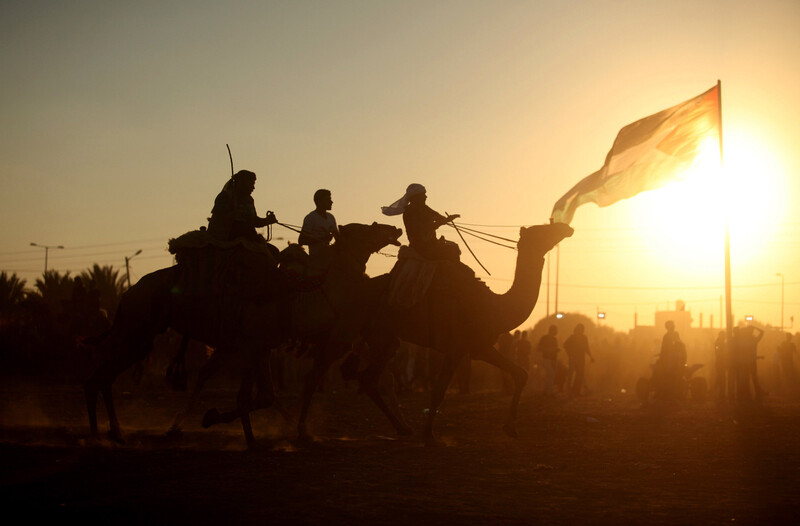
Palestinians ride camels during a Bedouin festival in Deir al-Balah, central Gaza Strip, on 16 September.
APA images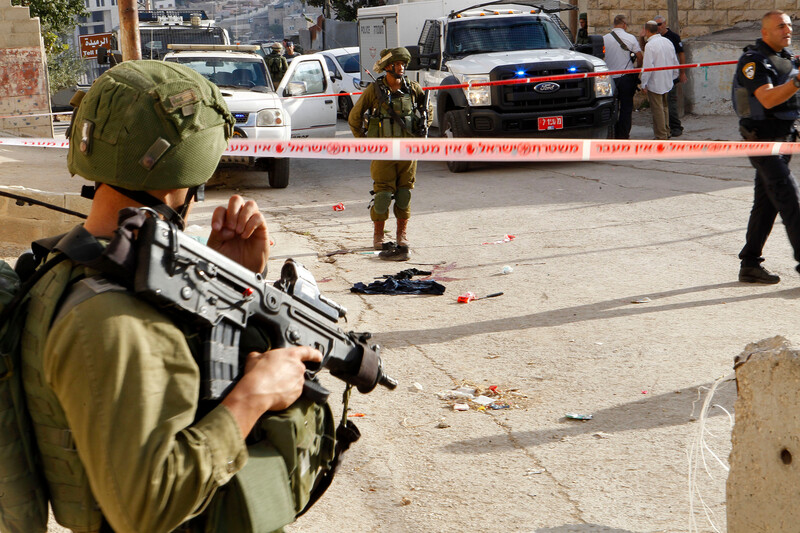
Israeli forces gather at the scene where a Palestinian allegedly stabbed a soldier before he was shot and killed in the Tel Rumeida neighborhood of the West Bank city of Hebron, the site of several other deadly incidents over the past year, on 17 September.
APA images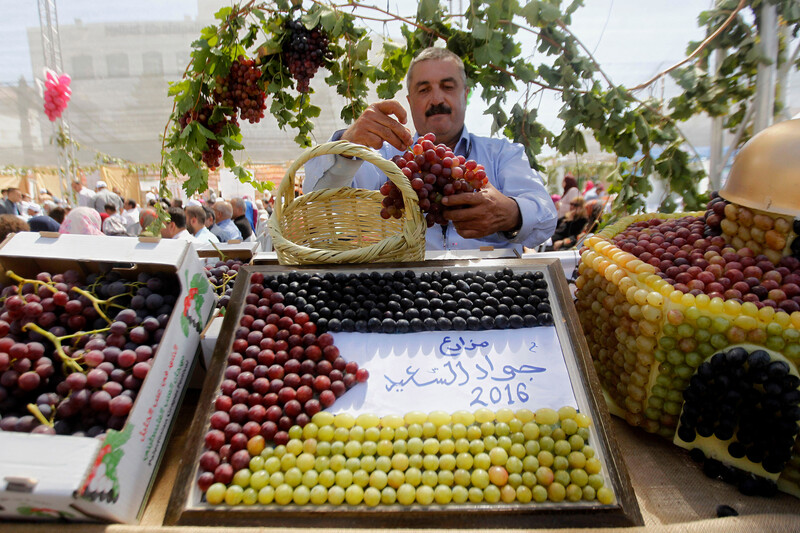
A display at the grape festival in Halhoul village, near the West Bank city of Hebron, on 19 September. The Hebron area is renowned for its production of grapes.
APA images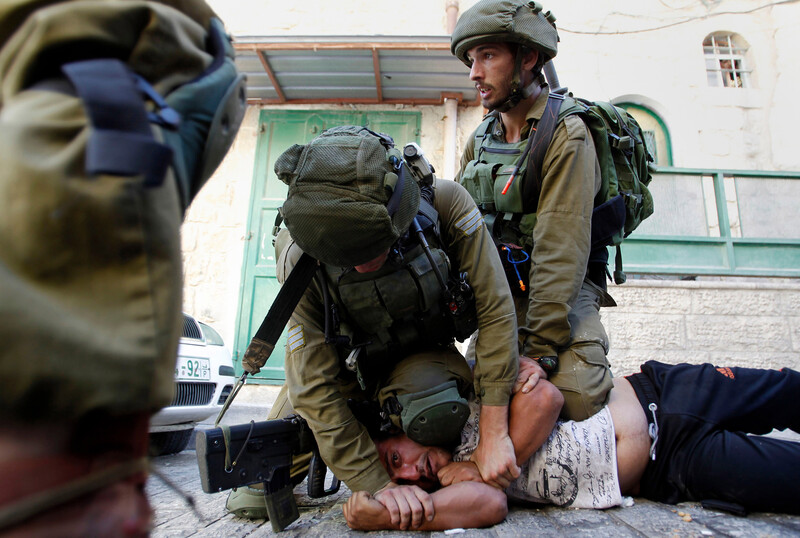
Israeli soldiers detain a Palestinian during a raid in the West Bank city of Hebron on 20 September.
APA images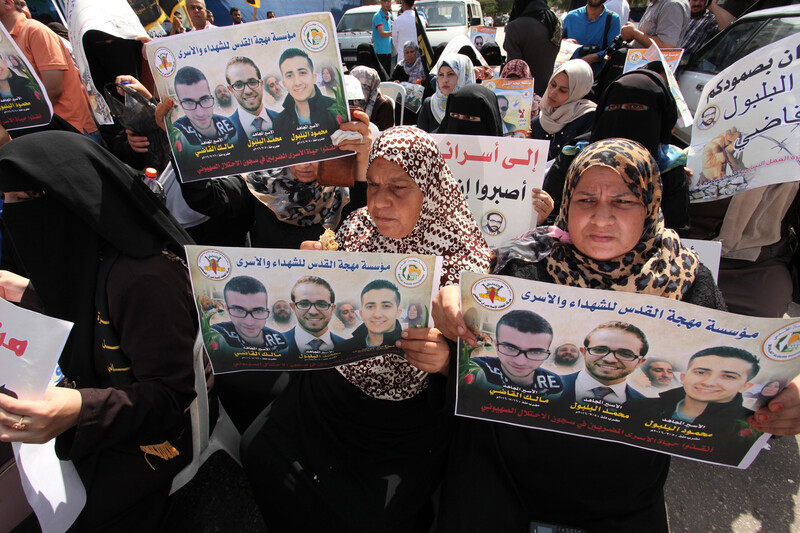
Palestinians protest in solidarity with prisoners on hunger strike in Israeli jails in front of Red Cross offices in Gaza City on 22 September.
APA images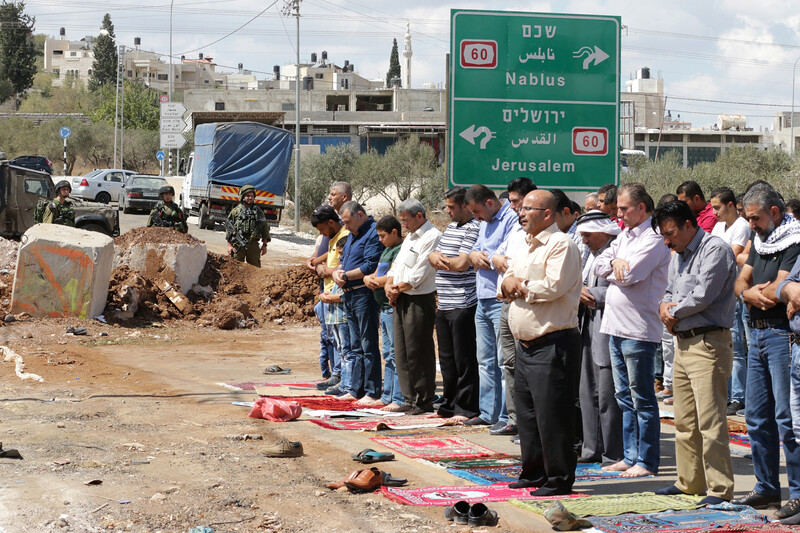
Palestinians perform Friday prayers during a 23 September protest of the closure of the main entrance of Beita, a town near the West Bank city of Nablus which has been blocked by dirt mounds left by the Israeli military since 19 September. Israel said the road was closed following numerous rock-throwing incidents at cars driven by Israeli settlers.
ActiveStills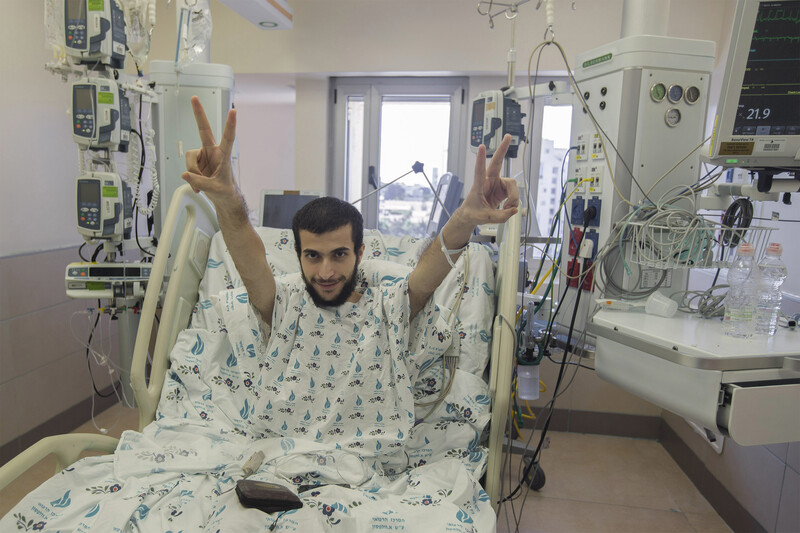
Malik al-Qadi, who ended a 70-day hunger strike days earlier, upon his transfer to a Palestinian hospital in the West Bank city of Ramallah on 24 September. Al-Qadi went on hunger strike to protest being held by Israel without charge or trial under military court order.
ActiveStills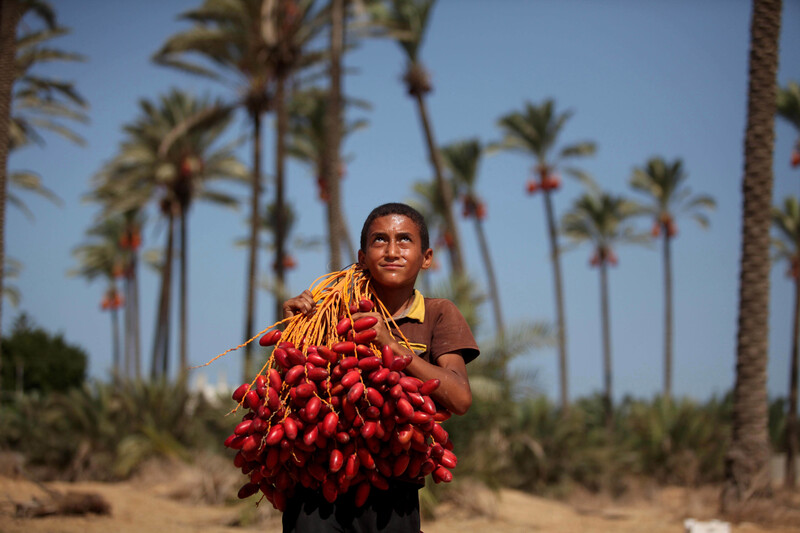
A Palestinian boy carries dates harvested from palm trees in Deir al-Balah, central Gaza Strip, on 25 September.
APA images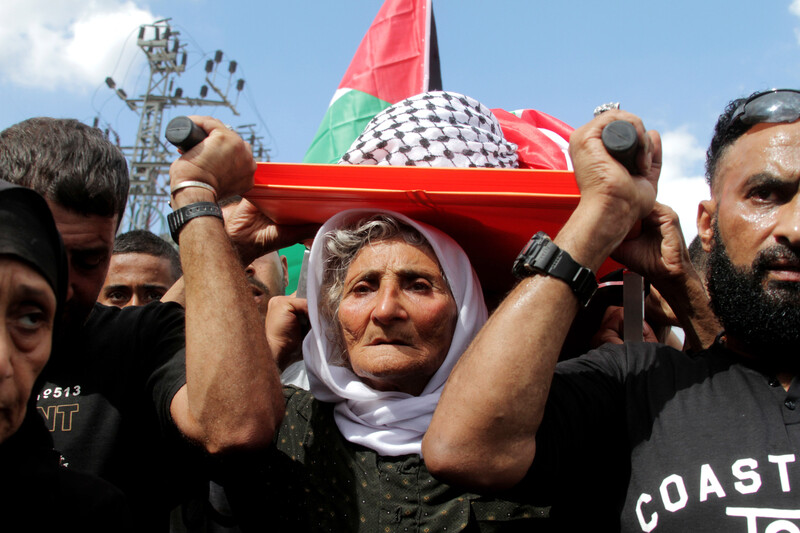
The mother of Palestinian Yasir Hamdouni carries her son’s body during his funeral in the West Bank village of Yabad, near Jenin, on 27 September. Hamdouni died of a heart condition in Israeli prison after years of medical neglect.
APA images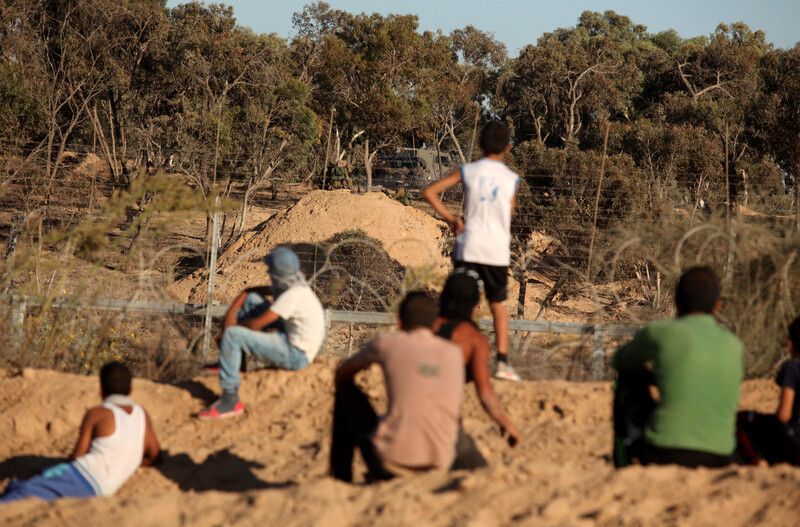
Palestinian protesters observe Israeli soldiers at the boundary between Israel and the central Gaza Strip on 30 September.
APA images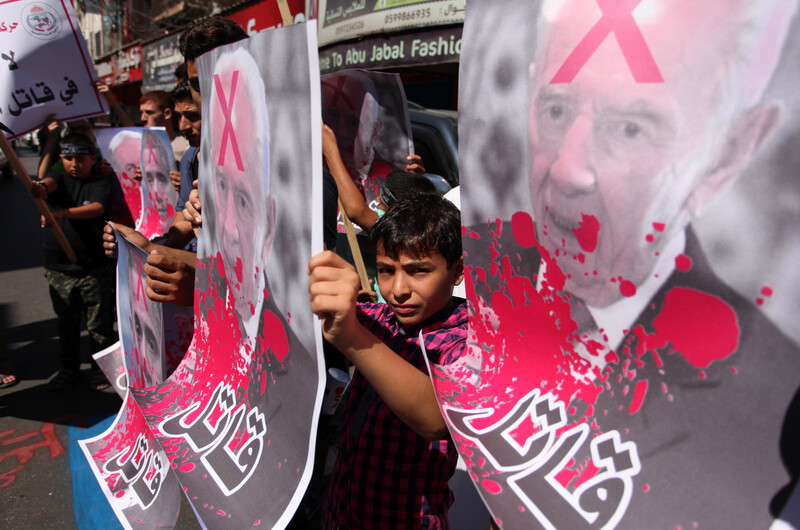
Palestinians hold posters of Israeli leaders Shimon Peres and Benjamin Netanyahu and US President Barack Obama labeled as “killer” before burning them during a rally following Friday prayers in Gaza City on 30 September, days after Peres’ death.
APA images

